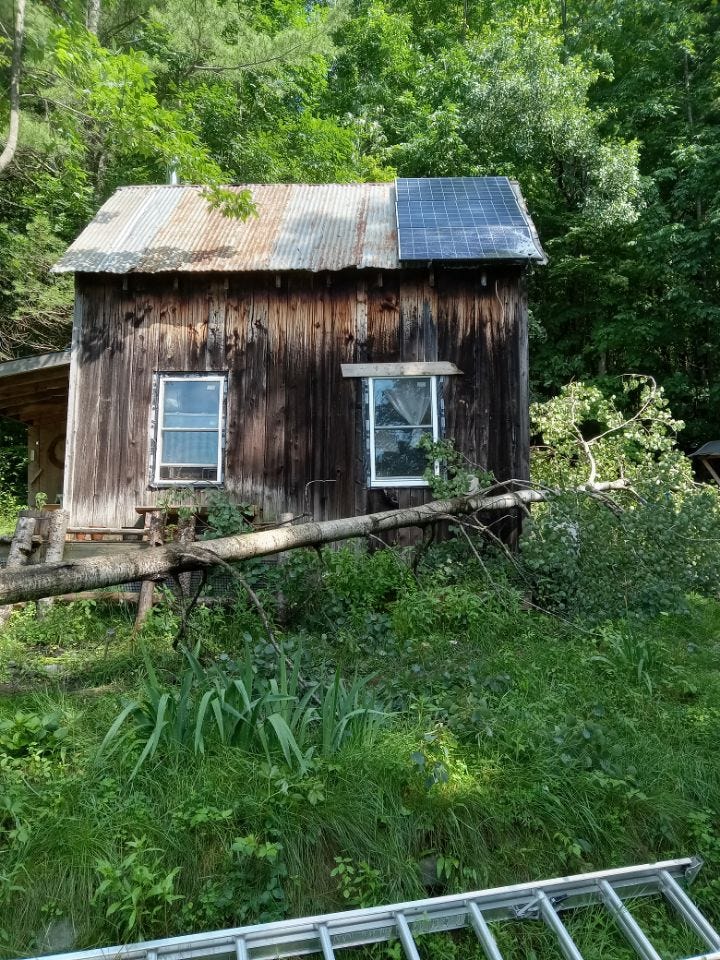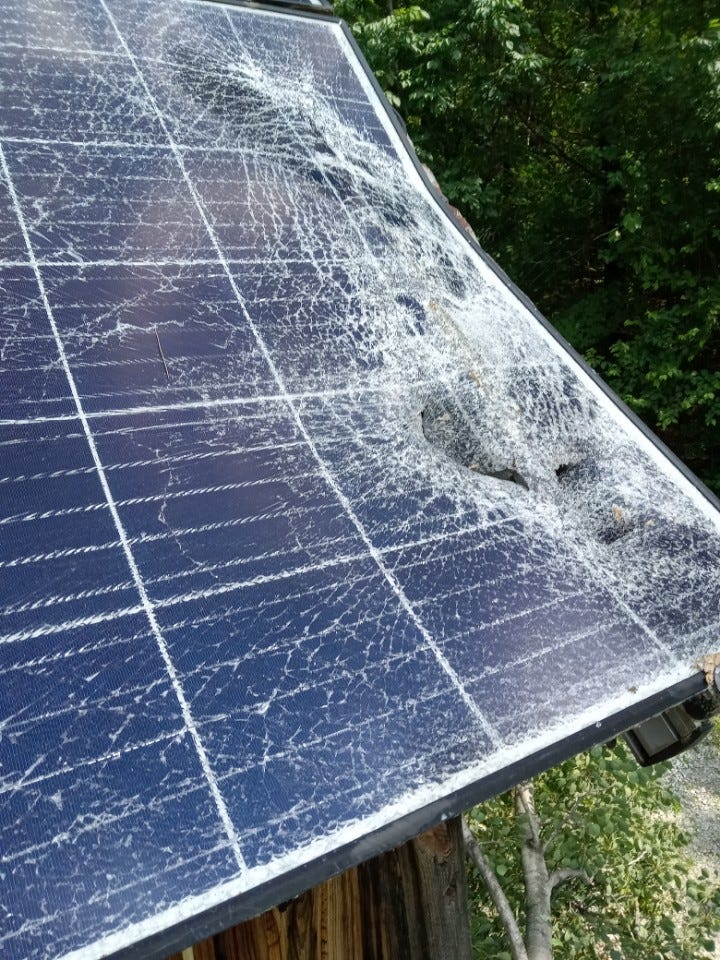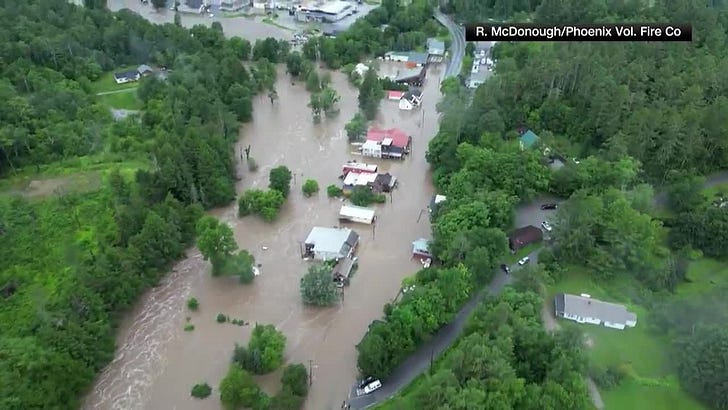I’ve been slowly putting together a newsletter on the frighteningly hot Atlantic Ocean but felt I would be remiss not to comment on the extraordinary flooding and storms we’ve seen in the Northeast over the past week and a half.
Vermont seems to have seen the worst of it (so far—it’s not clear this weather pattern is over, and yet another flood watch is in effect for tomorrow). As many of you probably saw, the state’s capital, Montpelier, was severely flooded by the Winooski River on July 10. A number of towns around the state were hit terribly, including Ludlow, Marshfield (which remains without water), Londonderry, and others. Some of the same places were also hit badly during the almost mythical and frequently referenced and remembered Hurricane Irene in 2011; it seems that mitigation strategies made after that disaster likely saved lives and prevented worse damage this month.
Last Monday’s flooding was only the first part; on Thursday a line of destructive thunderstorms—which spawned a tornado in Montreal, and at least one confirmed tornado in Vermont—came through the state. The storms weren’t as bad as predicted, it seems, but in this second bout a poplar tree fell on our small cabin and smashed a solar panel; I know others suffered much worse damage.
And on that note: I’ve seen some difficulties this past week but hardly the worst of it—people are really suffering, and in a state with the highest per-capita unhoused population in the country after California, things will stay rough.
It’s a funny, kind of nauseating feeling as you deal with these events—you begin to think, oh fuck, this is it, we’re really in it. But it shouldn’t be a surprise. We all know how bad climate change is, and that we’re collectively doing very little about it; we all experience the wild heat swings and the intense downpours and watch the wildfires on the news and breathe in the smoke. But then, by degrees I suppose, suddenly you’re in a situation even more serious and directly affecting—and you really feel how much it’s all advanced.
It can be deeply demoralizing. Rebuilding feels almost futile: this is bound to happen again, and our infrastructure, built for a different world, is fundamentally unequipped to handle it.


This is just as true here in Vermont—a place that’s supposed to “do better” as the climate rapidly warms—as anywhere else. And what could “do better” really mean? That the rhythm of our lives might continue comfortably as the rest of the world burns and floods? I think some people want, or have wanted, to believe that.
This belief is, I think, actually the unspoken or semi-sublimated wish of late liberalism, and the explicit and fascistic one of the right. But to believe such a future is possible is to be in denial, which is what I want to talk about. Because day by day I’m still shocked by the denial that permeates everything.
It’s not exactly climate denial, which, as it’s often conceptualized, is a misnomer. Those deluded Republicans, pretending it doesn’t exist! No—the right may be more histrionic, overt, and outwardly repellent about it, but denial is bigger than that. Ours is a culture steeped in, drowning in denial; denial is endemic, undergirding everything.
As I wrote in the first of these newsletters:
[The environmental crisis] is not just a crisis of energy (though that’s a big part of it, because humanity has spent a century-plus building an extremely complex and energy-intensive arrangement that relies on one finite and highly polluting source). Fundamentally, and more holistically, this is a crisis of ecology, of humans’ relationship to the natural world. Our species has, en masse, attempted to cut ourselves off from nature—you might say we have hubristically sought to transcend it—and that simply isn’t possible. The long crisis we’re living, in its varied forms, is the result. There’s no easy way to reckon with or remedy what we’ve created, but we must be clear about the situation and make the effort to meet it. To invert what Margaret Thatcher once said, now there are only alternatives.
I think, in the wake of these disasters, and in the more mild times (which are really only slow-motion disasters), we have to be clear about this. The world as it used to be does not exist anymore, there is no way to stop it from continuing to slip away—no amount of carbon offsets or electrification or green building will prop it up—and it’s not coming back. We’re into, and still moving into, something very new. And despite the terror, we shouldn’t fetishize that old world too much and its thin veneer of stability for the privileged of the world, because it ultimately gave us what we’re living with now.
We should, though, think about the world that came before it—the forests and intact wetlands that preceded colonization and provide irreplaceable natural means of storm remediation (among many other benefits). As Zack Porter, director of Vermont-based wildlands advocacy organization Standing Trees, wrote in an editorial today:
Before European settlement, old forests with pockmarked topography and full of downed logs, as well as extensive beaver-created wetlands, acted as sponges and traps for rain. Then came colonization. Montpelier and other towns hit hard by recent flooding were built within floodplains. Deforestation, intensive agriculture, and ongoing logging and roadbuilding have resulted in degraded forests that perform only a fraction of their flood mitigation potential. More than half of the wetlands in the Champlain Basin have been filled in.
Porter is correct: dealing with the devastating environmental impacts of civilization requires rewilding the world we attempted to pave over.
And of course, solidarity is key: despite the righteous despair, it has been heartening to see the remarkable human resilience and tremendous outpouring of support in local areas hit badly. And on that note, I’ll end with what Mutual Aid Disaster Relief wrote in a recent email calling for aid:
Some of the worst flooding took place in Vermont, a state known as one of the best areas to survive climate chaos, demonstrating that no region is safe from the impacts of humanity’s addiction to fossil fuels and ecocidal economics. But as people’s trust in a geographic refuge has weakened, trust in an interwoven, multi-dimensional refuge made up of our love and solidarity for each other is strengthening.
Please consider donating to them to help recovery efforts. All the (very limited) earnings from this newsletter are going there this month.



